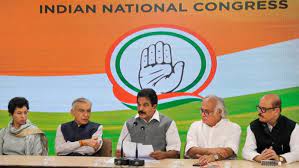NEW DELHI: Amid competing attempts at the national level to stitch a non-BJP front ahead of the 2024 Lok Sabha elections, the Congress on Sunday signalled clearly that it alone had the organisational and moral heft to lead any potential anti-ruling dispensation platform, having been consistent in its resistance of the saffron forces and the government, including on the Adani issue that it “planned to keep hammering until a JPC probe was ordered”.
Ahead of the party’s 85th AICC plenary session in Chhattisgarh’s Raipur from February 24 to 26, the Congress said the issue of Opposition unity would be deliberated at the crucial meeting and reflected in the political resolution. It also said “strong Opposition unity was impossible without a strong Congress”. AICC general secretary in charge of communications Jairam Ramesh articulated the party’s position a day after Bihar Chief Minister Nitish Kumar said he was awaiting a signal from the Congress on bringing the Opposition together, a move, he claimed, would limit the BJP below 100 seats in a 545-member Lok Sabha in the 2024 General Election.
“We do not need to give anyone a certificate that we have to lead because all attempts at Opposition unity will fail in the absence of the Congress. Strong Opposition unity is impossible without a strong Congress. We are already in pre-poll pacts in many states, including Bihar, Jharkhand, North-East and Kerala. So, it is not correct to say that the Congress does not strike pre-election alliances,” Ramesh said. He also sought to question a section of the Opposition for “soft-pedaling” on the Adani-Hindenburg row.
“We welcome Nitish Kumar’s remarks that the Bharat Jodo Yatra impacted the entire political landscape. It is a transformational moment for Indian politics and the Congress is very well conscious of its role. The Congress is the only party that has never compromised with the BJP,” Ramesh said. In a veiled attack on the Trinamool Congress, he said certain Opposition parties attended Leader of Opposition (Rajya Sabha) Mallikarjun Kharge’s meetings, but in actions “favoured the government”.
“We do not have two faces in respect of the BJP. We want a JPC on the Adani issue. Many parties that attended Opposition meetings in Parliament did not accept the JPC demand and said they wanted a SC-led inquiry. That was also a political move to save the Prime Minister,” Ramesh said, questioning the moral authority of some parties to take on the BJP.
The plenary session of the Congress, expected to take a clear line on the nature of Opposition alliances ahead of the next General Election, will pass resolutions related to politics, finances, youth, marginalised sections and also build on the “success” of Bharat Jodo Yatra, said AICC general secretary (organisation) KC Venugopal.
The session’s agenda will be set by the steering committee, which will meet on February 24. The plenary will conclude with a rally in Raipur on February 26. The committee will also decide whether the CWC election will be held or the past practice of nomination of members by the Congress president will continue. The CWC has 25 members of which party president and Congress leader in Parliament are ex-officio and permanent; 12 can be elected and 11 nominated by the Congress chief.
The arrangement gives the party’s leader in Parliament a favourable edge in the crucial decision-making body that has powers to unseat a sitting Congress chief, as it did with incumbent Sitaram Kesri in 1998. The plenary session will be attended by 15,000 delegates.


